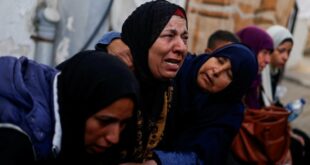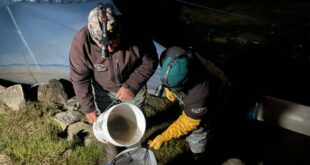Thousands of migrants landed in Lampedusa in days, essentially doubling Italian island's population

Record number of migrants overwhelm Italian island
This tiny Italian island isn't equipped to keep up with the thousands of migrants arriving from North Africa. An estimated 8,000 people have flooded Lampedusa in the past week, doubling the island's population and straining resources.
On the arid, windswept speck of an island that is Lampedusa — Italian territory that's closer to North Africa than Sicily — the same human drama has been playing out for more than a decade now.
Small, battered boats overloaded with exhausted human cargo arrive in port. Those who stumble off, thirsty and dazed, are taken to a dusty "hot spot" at the end of a road out of town.
If their numbers are low enough — the reception centre is equipped to take in 400 people — the migrants are given basics: water, food, shelter, clothing.
This week, though, upwards of 8,000 people arrived — more people than live on the island. The migrants, children and many teenage boys among them, were forced to sleep curbside and turn to the local church or charitable local restaurants for bread, a dish of pasta and water.
Almost 130,000 people have crossed the Mediterranean on boats to Italy so far this year. That's more than double the number of people in the same period last year. If the pace keeps up, it could turn into a record year of crossings.

For most who arrive, Lampedusa marks the end of a terrifying journey; it's also the start of a long, long wait for the better life they're seeking.
For a small group from Sierra Leone, in West Africa, that wait began on Friday under a blazing morning sun, as they stood with hundreds of others, set to board buses to take them to port, and then on a ship to mainland Italy.
"When you make this type of trip, you take a risk," said Turay, a tall, slim engineering student who carefully enunciated each word. He said his father was killed in sectarian violence back home and that he wants to finish his studies in Europe so he can support his family.
"There are many days in the desert, helter skelter, police who take your money, take your phones, everything in your hands," Turay said.
Encountering danger
His friends Momeal, 29, Sia, 23, and her 10-year-old daughter Aisha — who had a bold smile and neat pleats — sat on the curb beside him, listening and sometimes interjecting.
"They raped the ladies," said Momeal, who crossed with the others in a small boat with 40 people from Sfax, Tunisia.
"The Arab people, the mafias, the gangsters," added Turay.
Momeal said she and her sister knew the danger of the journey to Europe — the days it would take to cross the desert, the likelihood of sexual violence — but decided to risk to it in order to escape abusive marriages.

"They forced me to marry and every day, problems, fights, beatings," said Momeal.
"The same," said Sia.
When asked how the two got the money to pay the traffickers, Momeal looked away.
"It was not easy," she said. "That is a long story I do not want to tell."
WATCH | 11 Egyptians charged for migrant ship tragedy:

11 Egyptian men charged in capsized migrant ship tragedy
The 11 suspects arrested in the capsizing made a court appearance in Greece. Pakistan observed a day of mourning with hundreds of its citizens feared drowned.
Blaming the EU
On Friday, Italy's far-right Prime Minister Giorgia Meloni posted a video on social media in which she promised a tough response to the boat arrivals.
She said she had contacted European Council President Charles Michel to request he put immigration on the agenda of an EU summit next month, where she said she will request an immediate EU naval blockade in the Mediterranean to stop boats from crossing to Italy.
She also called upon the European Commission to immediately transfer $360 million Cdn to Tunisia as part of an EU pact with the country to stop migrant boat departures.
This week, Italian Transportation Minister Matteo Salvini, who gained renown in 2019 for stranding migrant rescue boats at sea for days, called the high number of boat departures from Tunisia "an act of war" and "the death of Europe," implying they are part of a conspiracy against Italy's right-wing government.
"When 120 boats arrive in one day, it's not an accident," said Salvini.

Giusi Nicolini, the former centre-left mayor of Lampedusa, dismissed Salvini's comments as lies to appeal to his populist base.
"It's the usual conspiracy theory talk about ethnic substitution, Europe against Italy," she said. "But the dangerous thing is that these theories are coming from members of the government, and the opposition doesn't counter them."
She says the squalid conditions that greet the migrants on the island is a conscious political choice to turn migration into a perpetual crisis, which right-wing parties then use to scare the electorate into voting for them.
That said, the far right is in many ways continuing practices of previous governments of different political stripes. They include clampdowns on NGO rescue boats, impounding their vessels, tying them up in red tape, banning them from conducting multiple rescues and sending them to faraway ports for the disembarking of migrants.
Political pacts
Until recently, most of the migrant boats left from Libya, but in the last several months, departures have shifted to Tunisia, the closest African country to Lampedusa. Tunisia was once the poster child of the Arab Spring, ushering in democratic reforms, but now teeters on the edge of social and economic collapse.
Italy has sought closer ties with Tunis and backed a European Union pact aimed at stemming migrant flows, with critics saying it turned a blind eye to Tunisian human rights violations.
But the pact to block people from leaving Tunisia on boats has had no effect, and more and more Tunisians are paying for spots on the traffickers' vessels.

Helme Nege, a legal secretary, was among them this week. The 30-year-old and his pregnant partner, Rawea, 23, arrived Monday after a three-day boat crossing. Since then, they've been sleeping in the small piazza overlooking the port at the end of Lampedusa's main tourist drag.
"There's no food, no water, nothing," said Rawea of the hot spot.
The pair each paid the equivalent of $3,000 Cdn to smugglers to cross on a wooden boat, selling everything to raise the money, says Nege.
Rawea says her biggest concern is the safety of her and her child. For Nege, it's being repatriated to Tunisia.
"If we get sent back, we have nothing," he said.
ABOUT THE AUTHOR

Rome correspondent
Megan Williams has been covering all things Italian, from politics and the Vatican, to food and culture, to the plight of migrants in the Mediterranean, for more than two decades. Based in Rome, Megan has also told stories from other parts of Europe and the world and won many international prizes for her reporting, including a James Beard Award. Her radio documentaries can be heard on Ideas and The Current. Megan is also a regular guest host on CBC national radio shows.
*****
Credit belongs to : www.cbc.ca
 MaharlikaNews | Canada Leading Online Filipino Newspaper Portal The No. 1 most engaged information website for Filipino – Canadian in Canada. MaharlikaNews.com received almost a quarter a million visitors in 2020.
MaharlikaNews | Canada Leading Online Filipino Newspaper Portal The No. 1 most engaged information website for Filipino – Canadian in Canada. MaharlikaNews.com received almost a quarter a million visitors in 2020.







